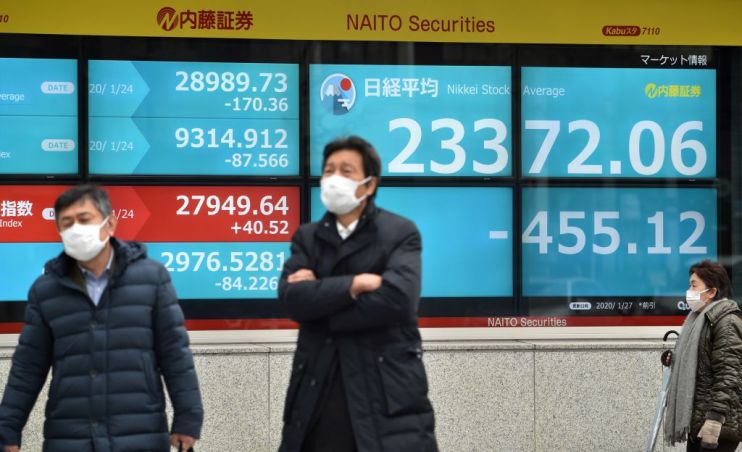Japan’s Nikkei sinks after global stocks’ Covid-19 plunge

Japan’s stock market plummeted overnight after a plunge in global stocks yesterday as investors reacted to a rapid spread of the Cobvid-19 strain of coronavirus outside of China.
The Nikkei sank 3.3 per cent after US and European stocks suffered similar falls as Italy revealed a huge rise to 229 cases of the Covid-19 virus. It also reported seven deaths and placed towns into lockdown.
That knocked British airline stocks as the FTSE 100 sank 3.3 per cent to X points. Today it has staged the start of a recovery.
The Nikkei sank an initial 4.5 per cent after staying closed yesterday due to a public holiday, but closed trading down 3.3 per cent.
Toyota’s stock fell 3.7 per cent and Uniqlo owner Fast Retailing dropped 4.2 per cent.
Both falls came in the context of business warnings on supply chain disruption due to the spread of the coronavirus. Primark owner Associated British Foods (ABF) yesterday said it would ramp up production away from China. And Jaguar Land Rover recently warned of a parts shortage due to factory closures.
However, while the Nikkei sank, Hong Kong’s Hang Seng index inched up 0.27 per cent after yesterday’s plummet. And South Korea’s Kospi rose 1.2 per cent.
Michael Hewson, chief market analyst at CMC Markets, suggested governments’ moves to curb global travel in light of the Covid-19 spread could have worsened the stock market rout.
“There is no question financial markets are coming round to the realisation that this particular crisis is likely to have a slightly longer shelf life than many thought was the case a couple of weeks ago, however flu outbreaks are hardly anything new,” he said, pointing to flu deaths of up to 650,000 people each year, according to World Health Organization statistics.
“That is not to downplay the seriousness of the coronavirus outbreak, given how little we know about it, but it could be argued that the reaction of governments to the outbreak in closing borders and restricting movement is actually making things worse, as well as sowing confusion and fear amongst their populations.
“For now, there appears little prospect that financial markets look likely to settle down in the short term, which means investors will have to get used to an extended period of uncertainty and volatility.”